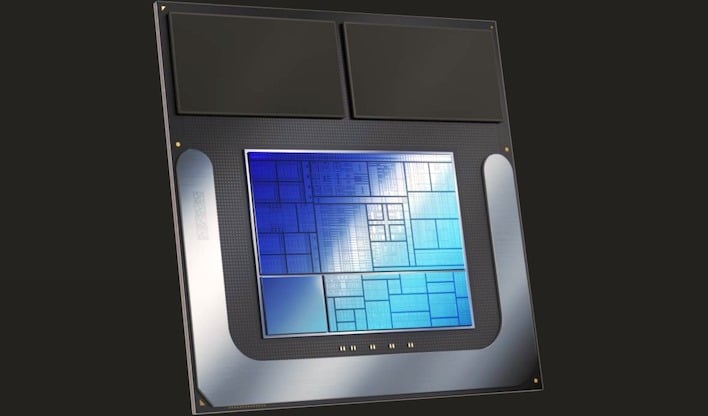
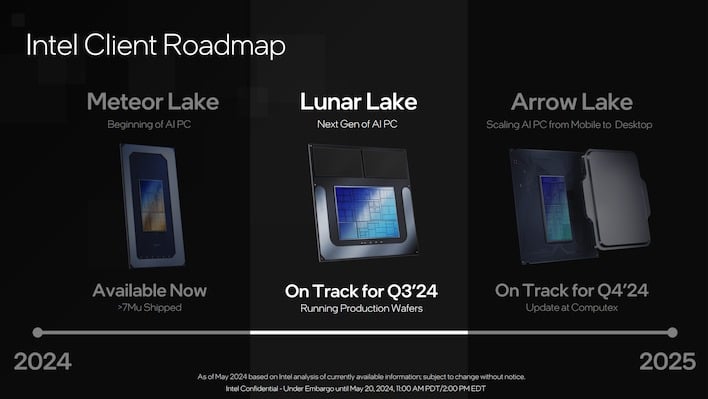
Intel says that Lunar Lake represents the “Next Gen of AI PC”. Well, fair enough. What’s more interesting is that it is apparently on track for Q3 of this year, and that Intel is currently running production wafers for this design to find its way into products possibly as soon as next month, but more likely July or August. This is in sharp contrast to earlier leaks that anticipated the parts arriving in 2025.
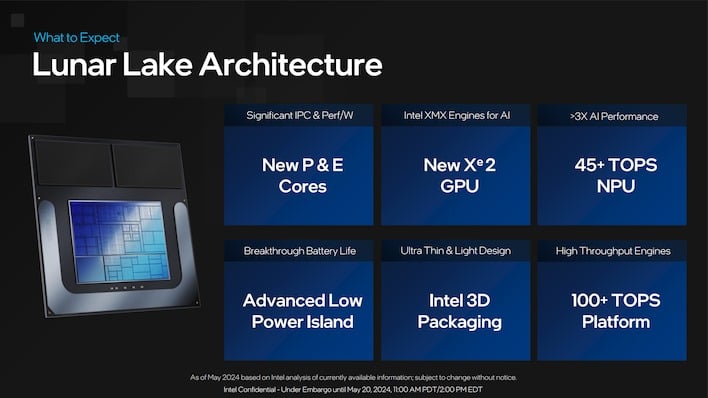
So what is Lunar Lake? If you’re a regular reader of this site or others like it, you’ll probably know a fair bit about the design already. In short, Lunar Lake is the codename for Intel’s next-generation mobile product. In addition to incorporating LPDDR5X memory directly on the processor package, it also brings new architectures to every single part of the chip: the high-power Performance cores and the low-power Efficiency cores, the Arc Graphics GPU, and the AI-accelerating NPU. Furthermore, Intel says that advancements in the low power island have resulted in radical improvements in efficiency, too.
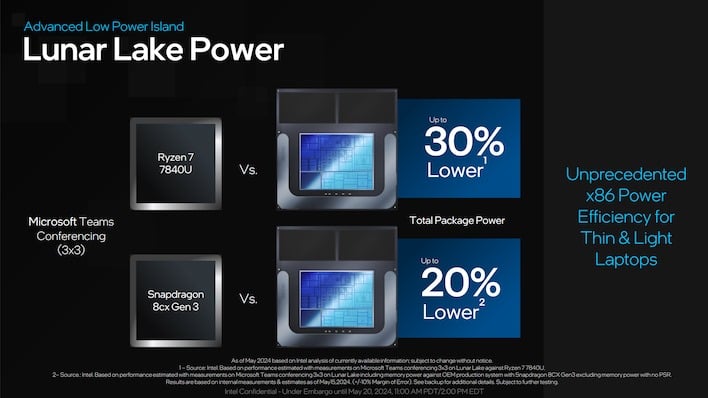
How radical? Intel says that total package power while videoconferencing in Microsoft Teams on Lunar Lake is 30% reduced compared to AMD’s Ryzen 7 7840U “Phoenix” processor. Comparing against ARM, Intel marks down another win, with a supposed 20% gain in efficiency over a Snapdragon 8cx Gen 3 part. Of course, we have to note that the 8cx Gen 3 is not a Snapdragon X Elite, but Intel didn’t shy away from comparisons to Qualcomm’s wonder SoC.
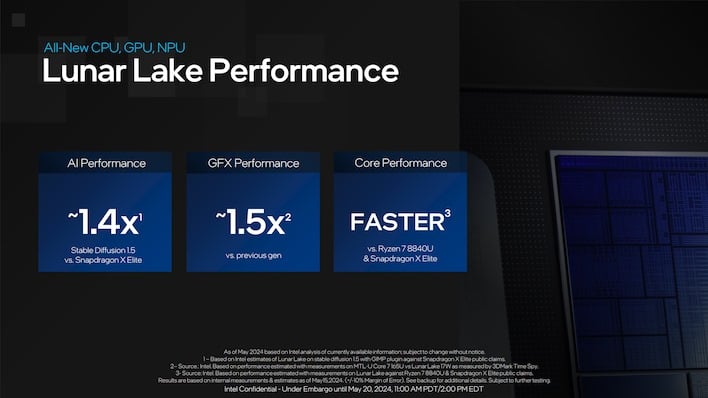
In terms of raw performance, Intel says that Lunar Lake offers a 40% boost in AI compared to the Snapdragon X Elite, and a 50% boost in graphics performance compared to Meteor Lake. Meanwhile, it says that the CPU cores are “faster” than AMD and Qualcomm’s finest according to its own estimations. Unlike the other two results, this isn’t backed up by empirical testing, so take it with an extra grain of salt, but it’s certainly not impossible.

Of course, you can’t call your processor “the next gen of AI PC” without having some monstrous AI performance. Intel says that Lunar Lake is capable of breaking 100 TOPS, or trillion operations per second, for AI tasks. That figure is achieved by combining the new NPU’s “>45 TOPS” performance rating with the updated GPU’s “>60 TOPS”. Both of those numbers are much higher than on Meteor Lake, and while Intel isn’t sharing any deals about the change to the NPU yet, we know how they got there with the GPU.
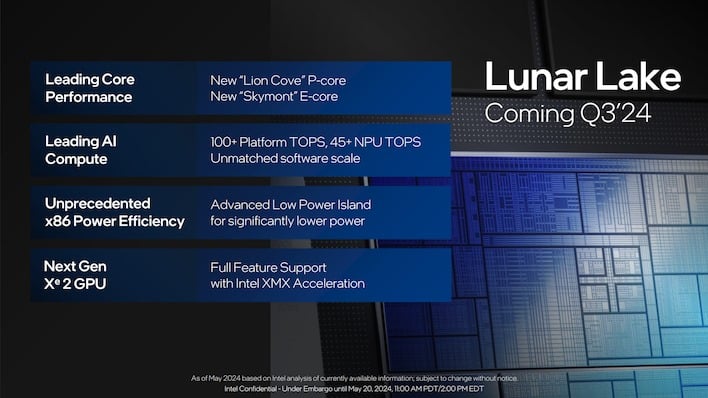
Indeed, Lunar Lake will mark the first appearance of Intel’s Xe2 graphics architecture, also known as “Battlemage”. Curiously, where Meteor Lake’s Arc Graphics were slightly cut-down from the Xe-HPG architecture used in Alchemist—the Meteor Lake IGP lacks XMX matrix math units, analogous to NVIDIA’s “tensor cores”—it looks like Lunar Lake’s integrated GPU will include XMX capability, giving it greatly improved AI performance as well as access to the Arc-exclusive form of Intel’s XeSS upscaling.
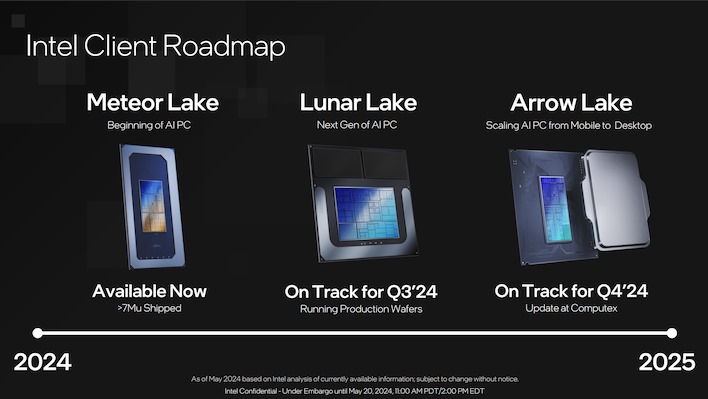
Decidedly the most surprising announcement to come today is that Lunar Lake is definitely coming ahead of Arrow Lake. Ever since we first heard the terms “Lunar Lake” and “Arrow Lake”, it was assumed that the desktop processors would come first, with Lunar Lake coming later. Intel explained to us that Lunar Lake would be coming sooner than later, but having the mobile parts before the desktop CPUs is a bit of a surprise.
One aspect that Intel didn’t discuss today is the matter of what fabrication process that it is using for Lunar Lake. An earlier leak claimed that Intel planned to make the chips on its 18A process, but as 18A is not quite ready yet, the parts you’ll see in laptops later this year were actually made on TSMC’s N3B. Intel did not confirm or deny that for us today.
Intel’s slides say that we’ll learn more about the desktop CPUs at Computex, but we’re undoubtedly also going to see a pile of Lunar Lake laptops. Here’s looking forward to seeing the fruits of Intel’s labors.

